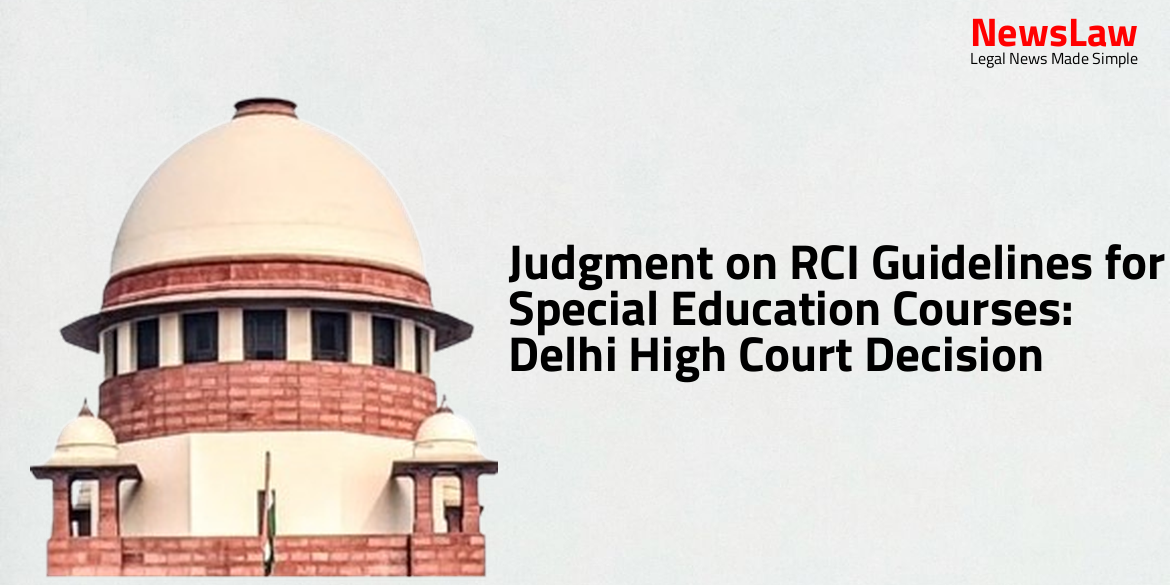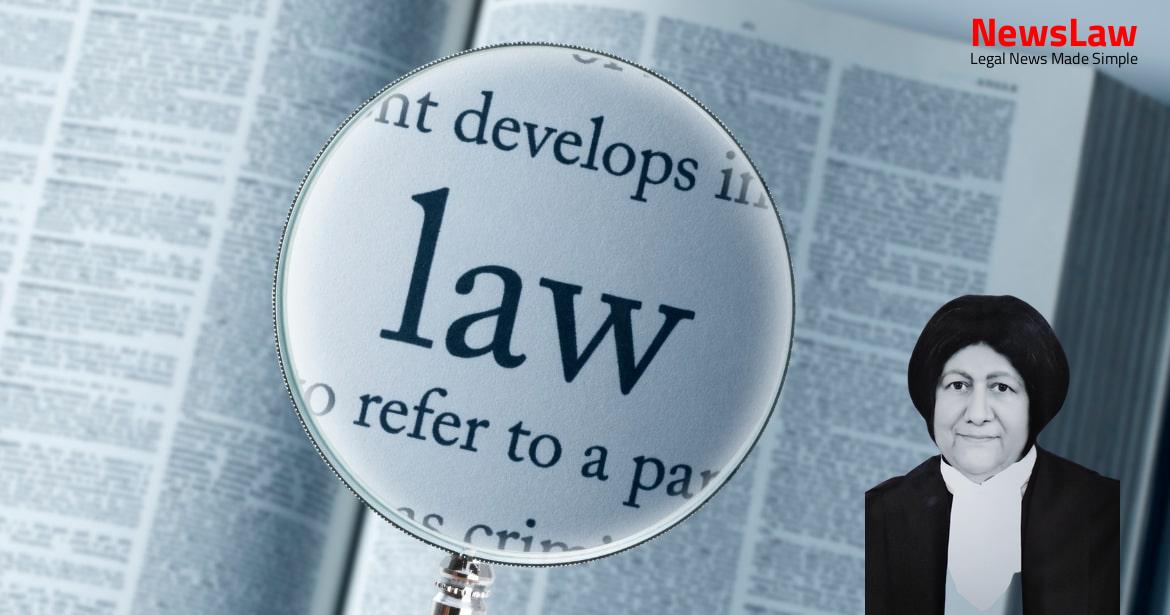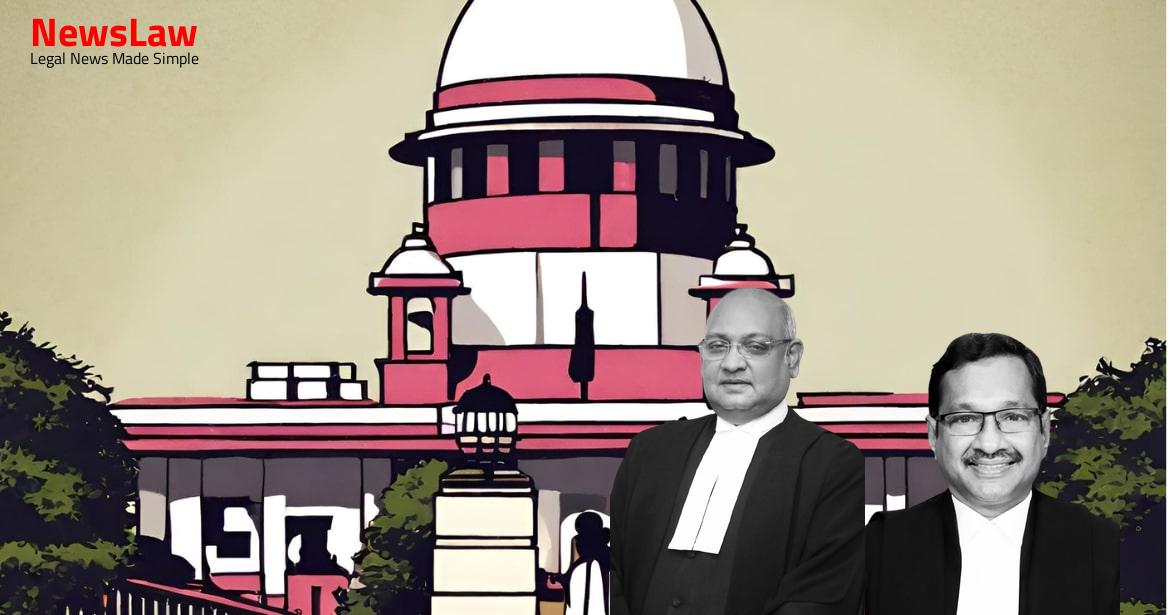In a landmark decision, the Delhi High Court has ruled on the case involving the Rehabilitation Council of India (RCI) guidelines for Special Education courses. The judgment addresses the grievances of institutions, who invested in setting up infrastructure following representations made by the RCI, only to have their applications returned without consideration. This ruling sets a definitive precedent for legal clarity in the realm of Special Education courses, impacting the future of academic policy in the country.
Facts
- The RCI issues guidelines and regulations governing applications for establishing institutions providing Special Education courses.
- The RCI also allows for the enhancement of intake in colleges already offering Special Education courses.
- The petitioners, institutions providing rehabilitation professional courses, applied to commence new special education courses.
- Their applications were returned without consideration by the RCI.
- The petitioners challenge the decisions in the circulars dated 4 January 2024 and 8 March 2024 through writ petitions.
- The petitioners argue that their infrastructure and standards conform to the RCI norms, and thus their applications should not have been rejected.
- The RCI’s vacillating stance on the matter is a point of contention for the petitioners.
- Regulation 24 mandates institutes seeking to start Special Education courses to obtain prior approval from the RCI or the Central Government.
- The Court is tasked with evaluating the legality of the respondents’ decisions regarding the processing of the petitioners’ applications.
- The increase in seat intake for special educators in existing institutions is also under scrutiny for its legal validity.
- Key consideration is whether the respondents’ actions were in accordance with the law.
Arguments
- Mr. Sharawat argues that the decisions to return the petitioners’ applications for starting new Special Education courses were solely based on a communication from the Hon’ble Minister, which he deems illegal as it exceeds the RCI Act’s parameters.
- He emphasizes that the Central Government cannot interfere in granting approval for Special Education courses as per the RCI Act, except for framing rules.
- Mr. Sharawat asserts that the decision to return applications lacked independent consideration and solely relied on the Hon’ble Minister’s letter.
- He argues that the decisions were arbitrary, hasty, and unsustainable in law, lacking any justifiable reasons other than referencing the NEP 2020.
- Mr. Sharawat highlights the absence of specific infrastructural requirements for institutions exceeding the 35-seat limit in Special Education courses, making the decisions legally questionable.
- The impugned decisions are deemed arbitrary and likely to compromise academic standards, as they allow institutions to exceed the prescribed intake limit without proper justification.
- Ms. Jauhari counters Mr. Sharawat’s arguments by stating that the decisions were part of an academic policy decision reviewed by the EC and not subject to judicial interference.
- She contends that the decisions were made in light of the urgent need for more Special Educators and the evolving requirements under the NEP 2020, justifying the relaxation of norms for existing institutions.
- Ms. Jauhari also points out that the decisions were discussed in EC meetings, showing a process of consideration and application of mind.
- Mr. Sharawat rebuts by asserting that rules and norms cannot be altered midway and decisions made hastily are inherently flawed, hence subject to being quashed.
- He refers to legal precedents to support his argument against hurried decision-making by the executive, reinforcing the need for proper deliberation and justification.
- 571 institutions had set up infrastructure for special education courses as per the requirements of the Norms based on invitations from the respondents.
- These institutions were put in jeopardy due to the actions of the respondents.
- The Central Government cannot interfere in executive discretion when legislation occupies the field.
Analysis
- The RCI issued circulars inviting fresh proposals for all Special Education courses, including Diploma Level courses, for the academic session 2024-2025.
- The petitioners invested in setting up their institutions based on the representations held out by the RCI regarding the submission of proposals.
- The decision to return the petitioners’ applications was based on a letter from the Hon’ble Minister, which was the sole basis and not justified.
- It was found that the petitioners can’t be restored to the status quo ante due to their irreversible position, making the representations final and irrevocable.
- The impugned decisions lacked a supervening public equity or public interest justification.
- The guidelines provided by the RCI for institutions intending to provide Special Education courses were applicable and adhered to by the petitioners.
- The Executive Committee has the authority to delegate administrative and financial powers to the Chairperson or the Member Secretary as needed for day to day operations.
- The Chairperson of the Executive Committee can invite representatives from other organizations or individuals to meetings as deemed necessary for the Committee.
- No Institute can start a rehabilitation professional course without prior approval from the Council or the Central Government.
- Institutions seeking approval for professional courses must approach the Council through the respective State Government or Union Territory Administration.
- State Governments or Union Territory Administrations must clearly indicate their stance on allowing colleges or institutions managed by Non-Governmental Organizations.
- In urgent cases where circulating the matter to the Executive Committee members would delay action, the Chairperson can exercise the powers of the Council, subject to ratification in the next committee meeting.
- Regulations 7, 12, and 24 highlight the procedures for Annual General Meetings, powers and functions of the Executive Committee, and norms for starting a Rehabilitation Professional Course respectively.
- The principle of promissory estoppel is applicable against the Government.
- The Government can be allowed to change its stand if there is a supervening public equity.
- In case of public equity, the Government can withdraw from representations that induced certain actions by individuals.
- The Court must ensure that there is a valid public interest for the Government to change its stand.
- The law on this aspect has been emphatically laid down in the case of Motilal Padampat Sugar Mills Co. Ltd. v. State of U.P.
- Urgent need for additional Special Educators acknowledged
- Public interest cannot justify the return of petitioners’ applications for starting new D.Ed. Spl. Ed. and B.Ed. Spl. Ed. courses
- Impugned decision to return the applications cannot be justified by NEP 2020
- Legal position clear, no need to address other issues or cited decisions
Decision
- The decision to grant approval for seat enhancement will be based on verification of requirements.
- The Council will conduct inspections before the enhancement of seats.
- The Circulars dated 4 January 2024 and 8 March 2024, returning the petitioners’ proposals, are quashed and set aside to the extent they return the applications.
- The proposals will be processed in accordance with the law.
- The challenge to the second Circular dated 8 March 2024, allowing existing institutions to increase seats, is dismissed.
- The writ petitions are partly allowed with no orders as to costs.
Case Title: KARNIMATA COLLEGE OF EDUCATION Vs. REHABILITATION COUNCIL OF INDIA (2024:DHC:4642)
Case Number: W.P.(C)-6644/2024



